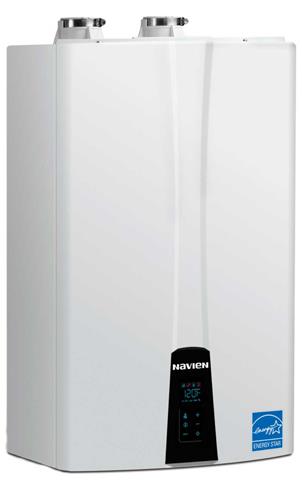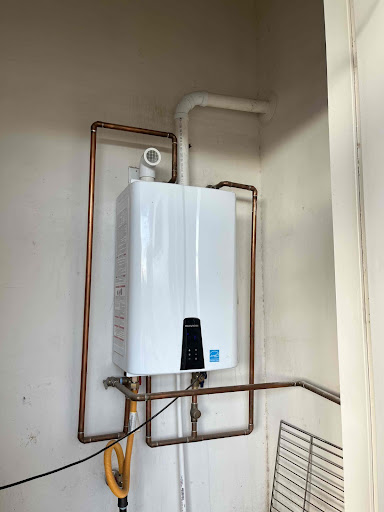Here in the next paragraphs you can discover some high-quality tips relating to Why You Should Consider a Tankless Water Heater.

In a world where convenience and efficiency reign supreme, it's no surprise that house owners are frequently in search of smarter ways to manage their home's power intake and convenience. One advancement that has actually progressively acquired appeal is the tankless hot water heater. However exactly what makes these systems stand apart from the conventional tank-based designs the majority of us matured with? Allow's dive in and discover the benefits of tankless water heaters, assisting you choose if it's time to make the switch in your home.
Introduction
Image this: you enter the shower after a long day, expecting a relaxing cascade of warm water, only to be welcomed by icy beads due to the fact that the last person used it all up. Noise familiar? Standard hot water heater keep a fixed amount of hot water, meaning you go to the grace of that storage tank's supply. Tankless systems, on the other hand, warm water as needed. No more running out mid-shower, say goodbye to fumbling with schedules just to make sure warm water is readily available.
Recognizing Tankless Hot Water Heater
What Are Tankless Hot Water Heater?
Tankless hot water heater, sometimes known as on-demand or instantaneous hot water heater, supply warm water just as it's required. As opposed to saving gallons of pre-heated water, these devices kick into activity the minute you turn on the tap. Water passes through a warm exchanger, heating up in real-time, meaning you obtain a nonstop flow of warm water without the demand for a huge tank resting lazily by.
Exactly how Do They Vary from Standard Equipments?
Traditional heating systems hold a storage tank of hot water, using energy to keep that tank at a regular temperature level. Tankless systems remove the standing supply, reducing squandered power and the cumbersome footprint of a big cyndrical tube. Basically, you're upgrading from a "stockpile" way of thinking to a "made-to-order" technique.
Typical Types of Tankless Devices
Tankless water heaters generally come in two ranges: gas and electric. Gas models have a tendency to deliver greater flow prices, ideal for larger homes, while electrical designs usually serve smaller homes and are normally easier to mount. In addition, some systems are made for point-of-use (offering one fixture) while others can manage the whole home's hot water requirements.
Key Benefits of Tankless Hot Water Heater
1. Endless Warm Water Supply
Ever before had to arrange showers so everybody gets their fair share of warm water? With tankless, that ends up being a distant memory. As long as the heating system's circulation ability isn't surpassed, you can take back-to-back showers without developing into a popsicle.
2. Power Effectiveness and Expense Cost Savings
Say goodbye to warming a titan container's well worth of water and maintaining it cozy all the time. Tankless heating units reduce standby energy losses, which can reduce energy bills. While the initial price could be higher, the long-lasting financial savings frequently warrant the financial investment.
3. Space-Saving Design
If your home is short on storage, removing the bulky storage tank liberates valuable room. Tankless devices are compact and can often be mounted on wall surfaces, hidden in edges, or set up in limited energy closets without hogging the whole room.
4. Longer Lifespan
A properly maintained tankless water heater can outlive its tank-based relative. Conventional storage tanks could last 10-15 years, while tankless models can maintain downing along for 20 years or more, making them a strong financial investment gradually.
5. Improved Water High Quality
Saving water in a storage tank can in some cases lead to debris accumulation or a slightly "off" taste. With tankless systems, fresh water is heated up instantly, reducing the opportunities of debris build-up and possibly offering cleaner-tasting water.
Factors to consider Before Changing
Though the benefits are engaging, it's smart to consider a few factors prior to totally committing.
First Financial Investment Expenses
Tankless heaters usually come with a higher upfront price. Between the system itself and possible setup modifications, the preliminary expense might offer you sticker shock. But remember to see it as a long-term financial investment.
Setup Requirements
Relying on your home's facilities, you may need additional electrical ability or gas line upgrades. Ensure you understand the setup demands and talk to a professional to prevent shocks.
Assessing Your Home's Water Use Patterns
If your house at the same time makes use of multiple fixtures with high warm water need, make certain the device's circulation rate fulfills your needs. Recognizing your usage patterns assists you select the right dimension and sort of tankless heating unit.
Maintenance and Care Tips
Tankless systems are relatively low maintenance, however they aren't set-it-and-forget-it devices.
Normal Cleaning and Descaling
Difficult water minerals can develop in the warm exchanger, influencing efficiency. Routine descaling (often recommended annually) maintains the system performing at peak performance.
Annual Professional Assessments
A yearly checkup from an expert ensures small concerns are caught early. They'll examine the device's efficiency, look for leaks, and aid keep ideal performance.
Making Sure Appropriate Ventilation
For gas models, proper ventilation is necessary to safely eliminate exhaust gases. Make certain venting systems are clean and correctly mounted to avoid any type of possible safety and security dangers.
Contrasting Different Brands and Versions
Not all tankless water heaters are developed equivalent.
Looking Into Dependable Producers
Try to find trustworthy brand names with a background of creating quality devices. A reputable maker usually provides much better customer assistance and longer warranties.
Reviewing Reviews and Individual Comments
Customer evaluations and comments from next-door neighbors or good friends that have actually gone tankless can use useful understandings. Often, real-life experiences can be extra informing than advertising sales brochures.
Installment: DIY or Professional?
While some home owners relish dealing with jobs themselves, tankless setup might not be the most effective time to break out the tool kit.
Pros and Cons of DIY Installation
A do it yourself install could conserve cash, yet it includes risks. Inaccurate installment can result in inefficiency or safety concerns. If you're handy and have experience, it could be feasible-- yet wage care.
When to Call an Expert Plumbing Technician
For many, calling a pro guarantees everything's done appropriately. A professional plumbing recognizes local codes, sizing demands, and venting parameters, lowering the threat of accidents.
Making the most of Efficiency
You have actually purchased a tankless device-- currently optimize its effectiveness.
Optimal Temperature Settings
Most people set their systems in between 120-140 F. Adjusting the temperature can enhance comfort and financial savings. Experiment to find a pleasant area that does not squander energy.
Pairing with Low-Flow Fixtures
Want to stretch your unit's capacities? Take into consideration setting up low-flow showerheads and taps. They decrease water use, enabling your tankless system to supply a consistent stream of warm water without straining.
Ecological Effect
Tankless hot water heater straighten with greener living objectives.
Reduced Carbon Footprint
By utilizing much less power and just home heating water as required, tankless systems can reduce your home's carbon footprint, lowering your environmental impact.
Conserving Natural Resources
Much less energy intake and much less wasted hot water convert right into less natural resources being used, an environmental win-win.
Who Benefits Many from Tankless Heating systems?
The appeal of tankless heating units is that they can match a range of households.
Large Households vs. Solitary Residents
Large families could love the unlimited hot water supply, while solitary owners appreciate the energy cost savings from not warming an entire storage tank for simply one person's morning shower.
Homeowners with Restricted Area
If your home is short on square video, shedding the bulky storage tank frees up area for various other fundamentals-- or maybe simply a lot more elbow room.
Eco-Conscious Customers
Going tankless aligns with environmentally friendly worths, ensuring you're not squandering energy or sources.
Future Fads in Tankless Water Heaters
The globe of home appliances is ever-evolving, and tankless hot water heater are no exception.
Smart Home Assimilation
Imagine adjusting your water heater's temperature level by means of an app or obtaining maintenance notifies on your phone. As smart home tech developments, we'll see even more connection and ease.
Developments in Technology
R&D is frequently enhancing heat exchangers, making systems extra efficient and resilient. Future versions could be even quieter, extra small, and far better suited for varying climates.
Conclusion
Selecting a tankless water heater is more than simply updating your home's warm water system; it's purchasing lasting comfort, energy performance, and a greener way of living. By considering your family's water use, bearing in mind installment demands, and devoting to normal upkeep, you can appreciate a constant stream of warm water without the baggage of a cumbersome container. As technology advances, you can eagerly anticipate also smarter, extra effective tankless options that not only make your life easier however likewise profit the earth.
Pros and Cons of Tankless Water Heaters
Tankless Water Heater Pros
Saves Energy: Simply put, you re spending less energy to create hot water, so your total carbon footprint goes down, not to mention your bills. Lasts Longer Than Storage Tanks: Storage tank units need to be replaced every 15 years or so. But tankless units? They can last for 30 years before they give out on you. Constant Hot Water: Need to take a shower and don t want the water running cold? Awesome it won t. The water will stay hot the entire time because it creates hot water on demand. Saves You Money: Less water usage equals less money. Beyond that, you re not paying to keep water hot 24/7. Those savings add up quickly. Better for the Environment: Less water waste is better for everyone. It saves you money, but it s also environmentally conscious at the same time. Tankless Water Heater Cons
It Can Take a Minute: Depending on your specific unit and its placement, it can take anywhere from 10 seconds to 2 minutes to fully heat up. Because there s no storage tank, it heats water as you need it. Upfront Purchase Price: While we talked about their longevity, there s sticker shock when you look at brand-new tankless units to install. It pays for itself, but it s still a big chunk of change at first. Has its Limits: If you run multiple appliances at once, such as the dishwasher, washing machine, and maybe you take a shower at the same time, there might not be enough hot water. https://www.airsouthnow.com/blog/water-heater-service/pros-and-cons-of-tankless-water-heaters/

Hopefully you enjoyed reading our post on Pros and Cons of Tankless Water Heater. Thanks a ton for taking a few minutes to read our posting. Remember to set aside a second to distribute this blog if you enjoyed reading it. Thank-you for your time spent reading it.
Website